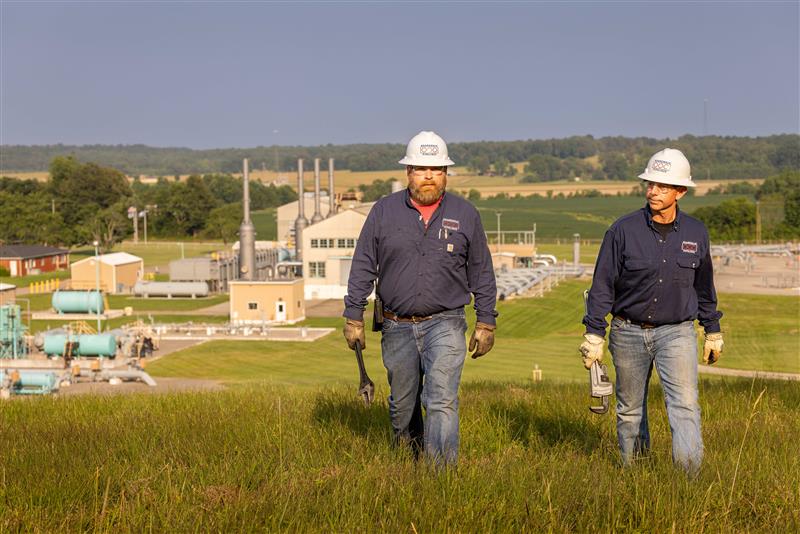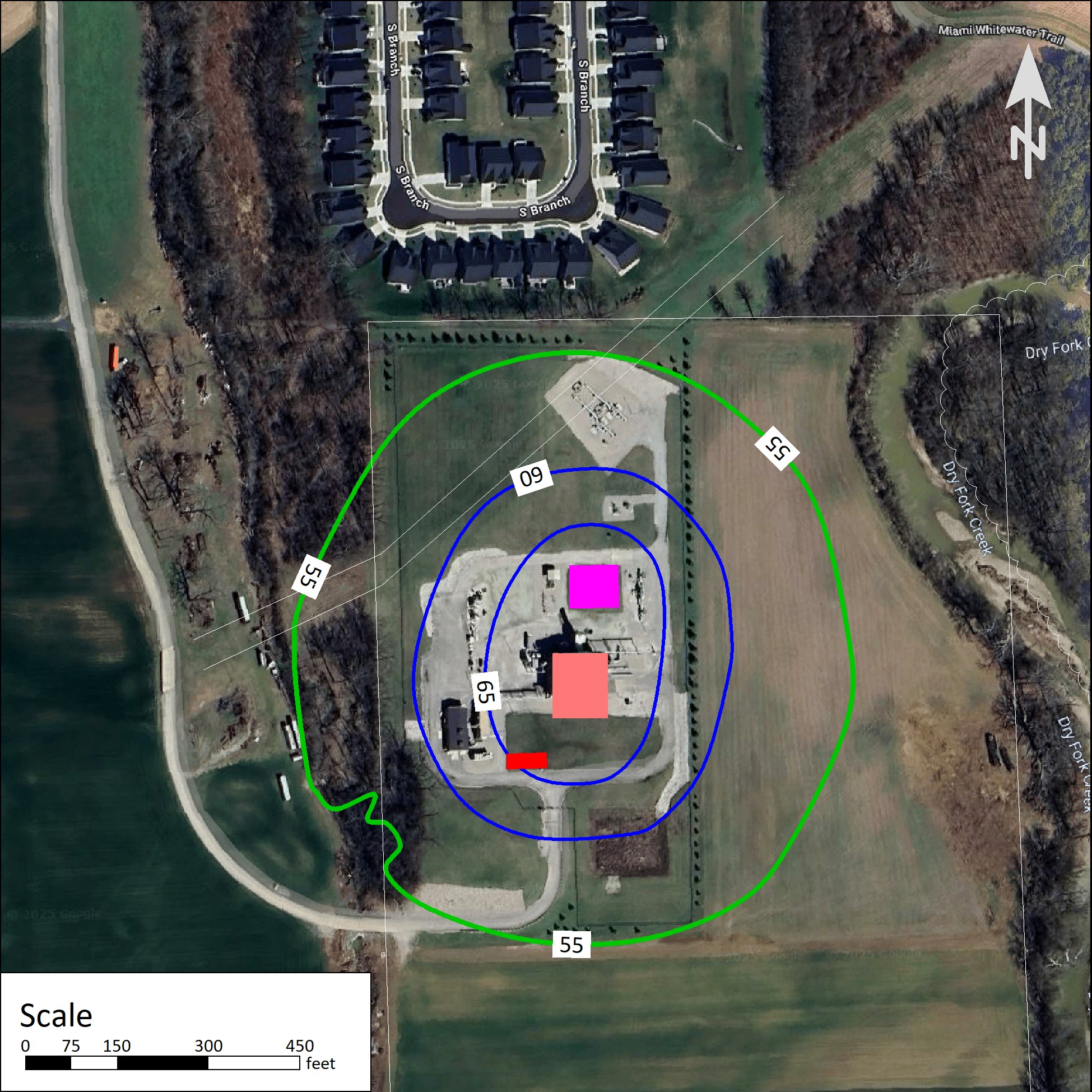Carnation Project
Supports increasing energy needs in the tri-state region
Enhances Texas Gas’s system capacity and reliability
Helps meet demand from local utilities and power generators
Aligns with Boardwalk’s commitment to safe, affordable and lower-carbon energy delivery
Project overview

The Carnation Project is a system upgrade proposed by Texas Gas Transmission, LLC ("Texas Gas") to meet rising natural gas demand in the tri-state area. By enhancing compression and regulation capabilities at existing facilities, the project will improve the capacity and efficiency of Texas Gas’s pipeline system. These enhancements will help serve residential, commercial and industrial customers while supporting regional energy reliability.
Project Resources: Project safety | Environmental Compliance | Public Participation | FAQs
.jpg)
.jpg)
Crosby-Harrison Compressor Station Considerations
The Crosby-Harrison Compressor Station was built in 2015 in a quiet, undeveloped area. Over time, nearby communities have grown, which influences how we design and operate our facilities.
As part of the Carnation Project, Texas Gas is implementing upgrades to reduce sound levels and enhance environmental performance. These efforts reflect our commitment to responsible operations and consideration for nearby communities. To achieve this, we’re implementing several improvements:
- Insulating piping: All above-ground pipes 6 inches or larger will be wrapped in high-quality acoustic insulation to reduce sound.
- Quieter equipment: We are investing in low-noise gas coolers and silencers that can reduce sound by up to 20 dBA during gas regulating activities.
- Enclosed compressors: We are modifying the existing compressor unit building to accommodate the new proposed compressor unit, ensuring it remains fully enclosed to help maintain a low-noise profile.
- Smart placement: We are conducting a dispersion study to help us place equipment like silencers in the most effective locations for reducing sound and emissions.
Additional benefits include:
- Non-reflective materials: New coolers will be made of non-reflective galvanized steel to minimize visual impact.
- Low-impact lighting: Lighting will remain manually operated for use at night to limit unnecessary light.
A sound study graphic is provided below to illustrate projected sound levels once the upgraded facilities are in service. The white line outlines our property boundary, while the blue and green lines show how sound levels disperse outward, demonstrating a sharp drop-off in sound intensity at the fence line and beyond.

Compressor Station Sound Information
Compressor stations are highly regulated to ensure minimal impact on surrounding communities. Texas Gas adheres strictly to the Federal Energy Regulatory Commission (FERC) guidelines, including the requirement that sound levels do not exceed 55 decibels (dBA) at the nearest noise-sensitive area, such as a home or business. This standard is comparable to the sound of a normal conversation, helping ensure a quiet and safe environment for nearby residents. The Carnation Project is being designed to meet the FERC’s 55dBA sound requirement. Sound surveys will be conducted before and after construction to verify compliance and ensure that operations remain unobtrusive to surrounding communities.

The flyers and links below include safety information on pipelines and compressor stations. These materials include helpful details about the role of compressor stations in natural gas transportation, along with the safety features built into their design and operation.
Project overview

The Carnation Project is a system upgrade proposed by Texas Gas Transmission, LLC ("Texas Gas") to meet rising natural gas demand in the tri-state area. By enhancing compression and regulation capabilities at existing facilities, the project will improve the capacity and efficiency of Texas Gas’s pipeline system. These enhancements will help serve residential, commercial and industrial customers while supporting regional energy reliability.
Project Resources: Project safety | Environmental Compliance | Public Participation | FAQs
.jpg)
.jpg)
Crosby-Harrison Compressor Station Considerations
The Crosby-Harrison Compressor Station was built in 2015 in a quiet, undeveloped area. Over time, nearby communities have grown, which influences how we design and operate our facilities.
As part of the Carnation Project, Texas Gas is implementing upgrades to reduce sound levels and enhance environmental performance. These efforts reflect our commitment to responsible operations and consideration for nearby communities. To achieve this, we’re implementing several improvements:
- Insulating piping: All above-ground pipes 6 inches or larger will be wrapped in high-quality acoustic insulation to reduce sound.
- Quieter equipment: We are investing in low-noise gas coolers and silencers that can reduce sound by up to 20 dBA during gas regulating activities.
- Enclosed compressors: We are modifying the existing compressor unit building to accommodate the new proposed compressor unit, ensuring it remains fully enclosed to help maintain a low-noise profile.
- Smart placement: We are conducting a dispersion study to help us place equipment like silencers in the most effective locations for reducing sound and emissions.
Additional benefits include:
- Non-reflective materials: New coolers will be made of non-reflective galvanized steel to minimize visual impact.
- Low-impact lighting: Lighting will remain manually operated for use at night to limit unnecessary light.
A sound study graphic is provided below to illustrate projected sound levels once the upgraded facilities are in service. The white line outlines our property boundary, while the blue and green lines show how sound levels disperse outward, demonstrating a sharp drop-off in sound intensity at the fence line and beyond.

Compressor Station Sound Information
Compressor stations are highly regulated to ensure minimal impact on surrounding communities. Texas Gas adheres strictly to the Federal Energy Regulatory Commission (FERC) guidelines, including the requirement that sound levels do not exceed 55 decibels (dBA) at the nearest noise-sensitive area, such as a home or business. This standard is comparable to the sound of a normal conversation, helping ensure a quiet and safe environment for nearby residents. The Carnation Project is being designed to meet the FERC’s 55dBA sound requirement. Sound surveys will be conducted before and after construction to verify compliance and ensure that operations remain unobtrusive to surrounding communities.

The flyers and links below include safety information on pipelines and compressor stations. These materials include helpful details about the role of compressor stations in natural gas transportation, along with the safety features built into their design and operation.
The Carnation Project involves the installation of natural gas infrastructure at two existing Texas Gas facilities in Hamilton County, Ohio. Specifically, the project will add a second compressor unit at the Crosby-Harrison Compressor Station to boost pipeline pressure and flow capacity. Additionally, it will upgrade gas regulation equipment at the New Haven Regulator Station to improve pressure control and system reliability. These installations are designed to support increased regional demand while incorporating sound reduction measures (such as acoustic insulation and low-noise coolers), emissions-reducing technologies, and smart equipment placement to minimize environmental and community impact.
Key Project Components
Compressor Station Enhancements: Installation of additional compression equipment at the existing Crosby-Harrison Compressor Station in Hamilton County, OH.
Regulator Station Upgrades: Modifications to the existing Harrison Regulator Station to improve pressure control and system performance.
System Optimization: Designed to improve flow and delivery of natural gas to meet growing demand in southwestern Ohio, northern Kentucky and eastern Indiana.
Construction / Operation / Safety
The Carnation Project will be constructed and operated in accordance with rigorous safety and engineering standards established by the Department of Transportation (DOT) and the Federal Energy Regulatory Commission (FERC). During construction, qualified inspectors will oversee each phase to ensure compliance with safety protocols, including thorough testing of equipment and systems before facilities become operational. Compressor stations will be equipped with emergency shutdown systems and monitored 24/7 to track gas flow, pressure and equipment conditions.
Operational safety will be reinforced through regular inspections and maintenance to detect and address potential issues early. Texas Gas also engages with local communities through public awareness programs, providing safety information and emergency contact details. Compressor stations are designed to minimize risk to surrounding areas and include features such as automatic and manual valves for rapid isolation, along with coordination with first responders to help ensure preparedness.
Environmental Considerations / Compression Station Sound Information
Environmental Considerations
Texas Gas is committed to responsible environmental stewardship throughout the Carnation Project. Compressor station upgrades will be designed and operated in accordance with federal and state environmental regulations, including permitting and compliance requirements set by the Environmental Protection Agency (EPA) and other relevant agencies. These standards help ensure that construction and operations are conducted in a way that protects surrounding communities and natural resources.
The timeline below reflects key milestones in the engagement, permitting, and construction processes for the Carnation Project. We will continue to update this section as the project progresses.
General Project Timeline
- Stakeholder Engagement: Q2 2025 – Throughout project
- Regulatory Review: Q4 2025 – Q4 2026
- Construction: Q1 2027 – Q4 2027
- In-Service: Q4 2027
Construction updates
There are no construction updates at this time.
In 2024, Texas Gas contributed approximately $4.3 million in ad valorem taxes to Ohio and approximately $2 million to Hamilton County, Ohio—supporting essential public services such as schools, emergency response and infrastructure maintenance.
Looking ahead, Texas Gas will actively collaborate with local officials, community organizations and residents to identify and pursue additional opportunities for community benefits.
Texas Gas is committed to ensuring that its presence in Hamilton County contributes positively to the social, economic and environmental well-being of the community.
Public input opportunities (concluded)
Community meeting materials
Community investment
Project support
Texas Gas is regulated by the Federal Energy Regulatory Commission (FERC), a federal agency that oversees the transportation of natural gas projects that cross state lines. The FERC’s role is to ensure these projects are safe, environmentally responsible, and in the public interest. Before any major project can move forward, the FERC reviews project plans in detail and decides whether it meets all the necessary standards.
On October 31, 2025, Texas Gas submitted a formal application for the Carnation Project, initiating FERC’s environmental review and public engagement process.
The FERC will notify applicable stakeholders, solicit feedback, and allow for public comment throughout the project application review process.
Carnation Project FERC Docket Number: CP26-16-000
Public participation in the FERC process
The FERC makes all public documents related to the Carnation Project available through its eLibrary. You can search by docket number or project name and adjust the date range as needed.
Stay informed by creating a FERC Online account. You can eRegister and subscribe to the project docket via eSubscription to receive email updates when new documents are posted.
Below are resources for accessing and participating in the FERC proceeding:
- This is a webpage describing the FERC Online website and all the options for getting involved in a project filing online:
- The FERC’s support staff can help you understand and navigate their FERC Online system:
- Telephone: 202-502-6652
- Toll-free Telephone: 1-866-208-3676
- TTY: 202-502-8659
- Email: ferconlinesupport@ferc.gov
- The Office of Public Participation (“OPP”) is a resource for guidance on participating in a FERC proceeding:
- Office of Public Participation (OPP)
- Telephone: (202) 502-6595
- Email: OPP@ferc.gov
FERC’s Office of Public Participation
The FERC’s Office of Public Participation (OPP) is a resource for anyone interested in learning more about how to engage in a FERC proceeding. Whether you’re looking to understand how the FERC works, find information about a specific docket, or participate in the regulatory process by submitting comments or intervening, the OPP is available to assist.
Office of Public Participation (OPP) | Federal Energy Regulatory Commission
We appreciate the interest in potential employment and contracting opportunities related to the Carnation Project. At this time, Boardwalk does not have any project-specific job openings or contract opportunities associated with the Carnation Project. However, we encourage individuals interested in joining our team to explore current career opportunities across our organization.
To view available positions and learn more about working at Boardwalk, please visit our careers page.
Landowner Inquiries
Mike Lusk – Land Manager
(713) 409-2548
Community Inquiries
(844) 211-6282

.jpg)





